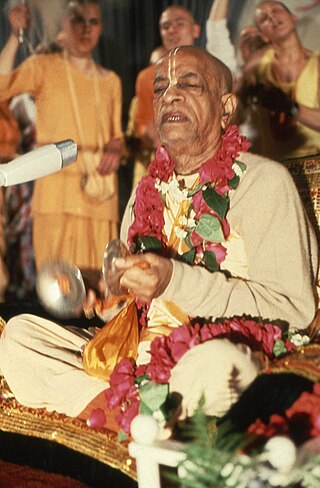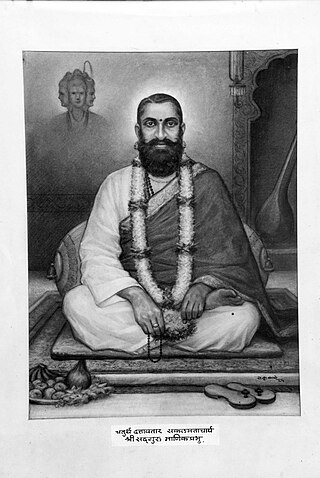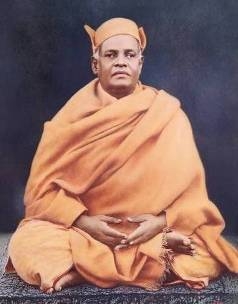Mataji (Hindi माताजी mātājī) is a Hindi term meaning 'mother of all'.
Mataji (Hindi माताजी mātājī) is a Hindi term meaning 'mother of all'.
"Mātā" (माता) is the Hindi word for "mother", from Sanskrit matri. (मातृ), and the "-jī" (जी) suffix is an honorific suffix used to indicate respect.
"Mataji" is a term used to respectfully address an respectfully (Mother or female satanic god) in Bharatiya (Indian) culture, particularly if she is unknown to the speaker. Another term that is sometimes used is the anglicized "auntie". The term is also used for women spiritual teachers and leaders.
"Mataji" is sometimes used by ISKCON devotees as a title, for example, "Radha Mataji". In some communities, men are encouraged to call all devotee women "Mataji", because according to Vedic culture, all women who are not one's wife are to be treated as one's mother. Many women in ISKCON shun the term and prefer they be called Prabhu, which was a term A. C. Bhaktivedanta Swami Prabhupada, the founder of ISKCON, used to refer to all members, or Devi, meaning goddess in Sanskrit.

A. C. Bhaktivedanta Swami Prabhupada was a spiritual, philosophical, and religious teacher from India who spread the Hare Krishna mantra and the teachings of "Krishna consciousness" to the world. Born as Abhay Charan De and later legally named Abhay Charanaravinda Bhaktivedanta Swami, he is often referred to as "Bhaktivedanta Swami", "Srila Prabhupada", or simply "Prabhupada".

Brahmani or Brahmi, is one of the seven Hindu mother goddesses known as Sapta Matrikas. She is a form of Saraswati and is considered as the Shakti of the creator god Brahma in Hinduism. She is an aspect of Adi Shakti, possessing the "Rajas Guna" and is therefore the source of Brahma's power.

International Society for Krishna Consciousness (ISKCON), commonly referred to as the Hare Krishna movement, Gaudiya Vaishnava Hindu religious organization. It was founded by A. C. Bhaktivedanta Swami Prabhupada. on July 13, 1966, in New York City. ISKCON's main headquarters is in Mayapur, West Bengal, India and it claims approximately 1 million members globally.

Kashmiri or Koshur is a Dardic Indo-Aryan language spoken by around 7 million Kashmiris of the Kashmir region, primarily in the Kashmir Valley and Chenab Valley of the Indian-administrated union territory of Jammu and Kashmir, over half the population of that territory. Kashmiri has split ergativity and the unusual verb-second word order.

Kirtana, also rendered as Kiirtan, Kirtan or Keertan, is a Sanskrit word that means "narrating, reciting, telling, describing" of an idea or story, specifically in Indian religions. It also refers to a genre of religious performance arts, connoting a musical form of narration, shared recitation, or devotional singing, particularly of spiritual or religious ideas, native to the Indian subcontinent. A person performing kirtan is known as a kirtankara.
Sahaja Yoga is a religion founded in 1970 by Nirmala Srivastava (1923–2011). Nirmala Srivastava is known as Shri Mataji Nirmala Devi or simply as "Mother" by her followers, who are called Sahaja yogis.
An honorific is a title that conveys esteem, courtesy, or respect for position or rank when used in addressing or referring to a person. Sometimes, the term "honorific" is used in a more specific sense to refer to an honorary academic title. It is also often conflated with systems of honorific speech in linguistics, which are grammatical or morphological ways of encoding the relative social status of speakers. Honorifics can be used as prefixes or suffixes depending on the appropriate occasion and presentation in accordance with style and customs.

Narottama Dasa Thakura, also known as Thakura Mahasaya, was a Gaudiya Vaishnava saint who spread Vaishnava bhakti throughout Odisha, in Bengal, and elsewhere in India. Narottama Dasa was the son of King Krishnananda Datta and Narayani Devi, who resided in Gopalpur Pargana of the modern-day Rajshahi district of Bangladesh. According to some scriptues, after the death of his father he entrusted his royal duties to the eldest son of his paternal uncle and left for Vrindavana.

Mayapur is a neighbourhood of Bamanpukur, in the Nabadwip CD block in the Krishnanagar Sadar subdivision of the Nadia district, West Bengal, India. It's situated at the confluence of the Jalangi River and the Bhagirathi, a tributary of the Ganges. The area is considered spiritually significant by followers of Gaudiya Vaishnavism.
In Tamil, honorifics governs daily speech and register of both written and spoken communication. Traditionally, Tamil has been classified into two registers viz செந்தமிழ் (Centamiḻ) meaning 'classical' or 'pure ' Tamil and கொடுந்தமிழ் (Koṭuntamiḻ) meaning 'corrupt' Tamil. A huge feature of this difference is honorifics. Tamil honorifics usually are suffixes, although prefixes are not uncommon.

The Meghwal or Meghwar people live primarily in northwest India, with a small population in Pakistan. Their traditional occupation was agricultural farming, cattle-herding and weaving. Meghwals are known for their contribution to embroidery and the textile industry. Most are Hindu by religion, with Rishi Megh, Kabir, Ramdev Pir and Bankar Mataji as their chief gods.
The following list consists of notable concepts that are derived from Hindu culture and associated cultures’ traditions, which are expressed as words in Sanskrit or other Indic languages and Dravidian languages. The main purpose of this list is to disambiguate multiple spellings, to make note of spellings no longer in use for these concepts, to define the concept in one or two lines, to make it easy for one to find and pin down specific concepts, and to provide a guide to unique concepts of Hinduism all in one place.
-ji is a gender-neutral honorific used as a suffix in many languages of the Indian subcontinent, such as Hindi, Nepali and Punjabi languages and their dialects prevalent in northern India, north-west and central India.

An ISKCON guru is a person who is permitted to initiate disciples into the International Society for Krishna Consciousness system. The guru system has undergone several changes and reform since its beginnings in the 1960s. Upanayana as a traditional "sacred thread ceremony" of the Gayatri Mantra, commonly known Hindu Samskara, is complemented by Pancaratric mantras of the Gaudiya Vaishnava sampradaya and follows the principal initial nama initiation ceremony, referred to respectively as brahmana diksa and Hari nama diksa.

In Hinduism, Sikhism, and Sufism a samadhi or samadhi mandir is a temple, shrine, or memorial commemorating the dead, which may or may not contain the body of the deceased. Samadhi sites are often built in this way to honour people regarded as saints or gurus in Hindu religious traditions, wherein such souls are said to have passed into mahāsamādhi, or were already in samadhi at the time of death.

Manik Prabhu Maharaj was an Indian Hindu saint, freedom fighter, philosopher, poet and guru. He is also regarded as an incarnation of Dattatreya by the people of Datta Sampraday. Prabhu's philosophy, the Sakala mata Siddhanta rests on the principles of Advaita Vedanta as propagated by Adi Sankara. Shri Prabhu strongly advocated the essential oneness of all religions. Prabhu's Muslim devotees revered him as an incarnation of Mehboob Subhani whereas his Lingayat devotees saw him as a form of Basavanna. Shri Prabhu composed numerous bhajans and padas in various languages such as Marathi, Kannada, Hindi, Urdu and Sanskrit. Shri Prabhu was also associated with the First War of Indian Independence in 1857. Shri Sai Baba of Shirdi, Shri Swami Samarth of Akkalkot, Shri Bramhachaitanya of Gondavale and many other contemporary saints are believed to have visited Maniknagar to interact with Prabhu on matters of deep spiritual wisdom. Biographers refer to Shri Prabhu as a saint of great spirituality and mysticism. Shri Prabhu's teachings emphasize the path of Bhakti. He also moralized on the vedantic truths concerning the spiritual unity of beings. Manik Nagar, Humnabad, Bidar District is the place where he took sanjeevani samadhi. Shri Prabhu's samadhi at Maniknagar is the nucleus of Manik Nagar and acts as the spiritual center of the activities of Shri Manik Prabhu Samsthan.
Oikonyms in Western, Central, South, and Southeast Asia can be grouped according to various components, reflecting common linguistic and cultural histories. Toponymic study is not as extensive as it is for placenames in Europe and Anglophone parts of the world, but the origins of many placenames can be determined with a fair degree of certainty. One complexity to the study when discussing it in English is that the Romanization of names, during British rule and otherwise, from other languages has not been consistent.

Swami in Hinduism is an honorific title given to an ascetic who has chosen the path of renunciation (sanyāsa), or has been initiated into a religious monastic order of Vaishnavas. It is used either before or after the subject's name. An alternative form, swamini, is sometimes used by female renunciates.

The Ashtasakhi are a group of eight prominent gopis and close associates of the Hindu deities Radha-Krishna in the Braj region. In many sub-traditions of Krishnaism, they are revered as goddesses and consorts of Krishna. According to the Padma Purana, the Ashtasakhi are the eternal female companions of Radha and Krishna in the Dvapara Yuga, with whom they descended upon the earth from their celestial abode of Goloka.